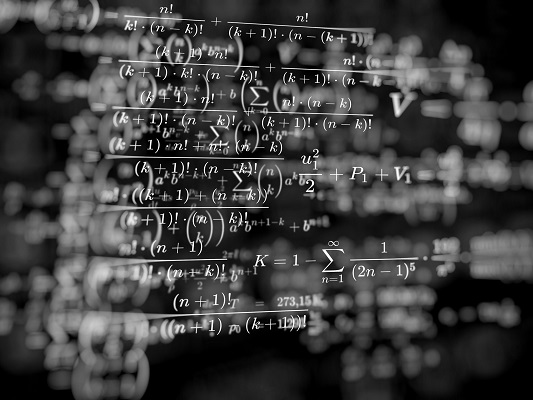If you’re contemplating going to graduate school for a master’s in applied mathematics, one of the highest-paying master’s degrees, you might wonder what to expect. Both the curriculum of a master’s in applied math program and the work that a career in mathematical science entails can best be described as a combination of mathematical science and knowledge of specialized fields of application.
A Core of Mathematical Knowledge
IMAGE SOURCE: Pixabay, public domain
To be able to apply mathematical concepts to other fields, you first need to have a strong grasp of those concepts. The core of your master’s in applied math curriculum will consist of coursework in the mathematical sciences. Often, this includes a class that covers the methods of mathematical modeling used to manipulate and display quantitative data in many different fields. Studies in statistics and probability are common in graduate school programs in applied mathematics. Studying these topics equips you with the knowledge and skills to analyze quantitative data.
Students accepted into a master’s degree program in applied mathematics are generally expected to have a background in linear algebra, differential equations and advanced calculus already. However, you might take additional graduate-level courses in these branches of mathematics. Applied algebra is a popular choice for graduate students in applied math programs.
Many master’s degree programs in applied mathematics are designed to be somewhat customizable to fit a student’s professional interests. Students can often choose from different academic tracks, including those in mathematics. For example, a student pursuing a concentration in differential equations might include intermediate partial and ordinary differential equations, numerical solutions of partial differential equations and complex analysis.
The curriculum of some applied mathematics master’s degree programs is so fluid that students may face only one required course and have the freedom to create a degree plan that meets the minimum number of math and non-math graduate-level courses.
Specialized Knowledge in a Field of Mathematical Application
What distinguishes applied mathematics from theoretical, abstract or “pure” mathematics is the focus on practical application. In applied mathematics, you’re not delving into math research purely for the sake of advancing the field of mathematics. Instead, you’re using your math expertise to answer questions and solve problems in the real world.
The fields in which you can put your applied mathematical knowledge into use are diverse and meaningful. There’s an option for every math lover who enjoys the challenges of addressing practical problems. If you want to contribute to public health, healthcare and medicine, you may need specialized knowledge of areas like bioinformatics and statistical genetics. Sports fans might apply their math skills in a sports statistician role after they gain specialized knowledge of sports analytics. Math applications exist in fields as diverse as education, marketing and psychology, according to the United States Bureau of Labor Statistics. Many master’s degree programs in applied mathematics include academic tracks in fields like data science, computer science, engineering, actuarial science and more.
Depending on the academic track and area of focus you choose, coursework in machine learning, data mining, stochastic models or fluid mechanics could be in your future.
Pulling Together Mathematical Science and Specialized Knowledge
For applied mathematicians in any given field, a combination of formal graduate coursework and work experience in your field is what helps you advance. Senior mathematician roles, naturally, confer more authority and more extensive job responsibilities than mid-level and entry-level roles in mathematics.
A master’s degree in applied mathematics is one way to advance your career, but your experience working in the field will also help you move up into higher-level positions. Some master’s in applied mathematics degree programs include a co-op component that allows students to gain hands-on work experience in the field over the course of their graduate studies.
A co-op experience can be particularly valuable for students who are new to the field of professional applied mathematics, because it provides students with their first real work experience. Finding a co-op placement in the specialized field in which you are most interested can help you land a more permanent job by allowing you access to a network of professional connections.
Another benefit to completing co-ops and other hands-on work opportunities during graduate school is the chance to find out what area of the field you enjoy. Because the applications of mathematics are so broad, it can be difficult to narrow down your options.
Additional Resources
What Is the Difference Between Pure Math and Applied Math?
What Are Some Topics You Study in Applied Mathematics?
Is There a Science Topic I Should Try to Be Strong in If I Want to Work in Applied Mathematics?

